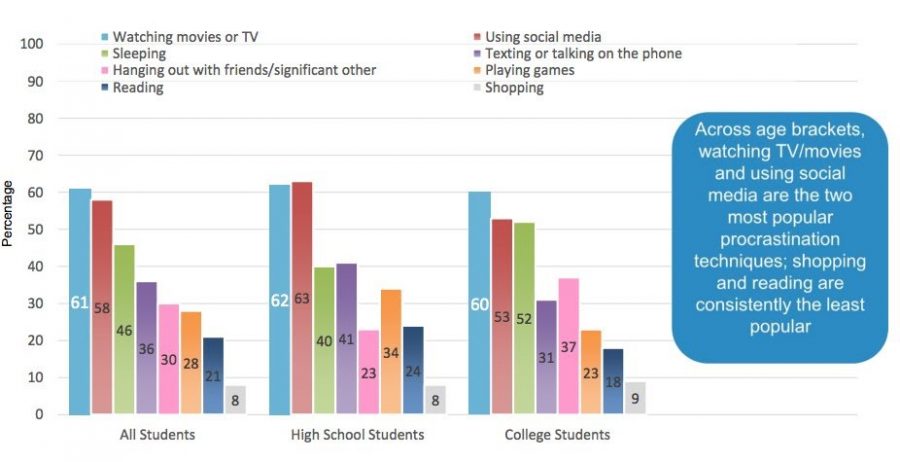Why Do We Procrastinate?
A survey of over 1,300 students in high school and college on the international network StudyMode. This chart displays the reasons students procrastinate. Credit: The Huffington Post.
December 24, 2017
Picture this: it’s 10 o’clock on a Thursday night. A girl finds herself typing up the last paragraph of the essay due the next morning.
Or perhaps, this: it is time for English class and a boy is hastily writing down the last few answers on the study guide during the mere seconds before the bell rings, class starts, and homework is collected.
If you relate to either, or even both, of these scenarios, then you too are victim to the trap of procrastination. Many students at Hingham High and elsewhere certainly are.
Procrastination is the avoidance of doing a task that needs to be completed or accomplished. And, contrary to the popular misconception that modern technology has created a generation of procrastinators, people have battled with this behavior since ancient times.
For example, as the Greek poet Hesiod wrote around 800 BCE, “put your work off till tomorrow and the day after.”
Additionally, the Roman consul Cicero, who lived from 106 BCE to 43 BCE, called procrastination “hateful” in the conduct of affairs.
Everyone puts responsibilities off until the last minute from time to time, but chronic procrastinators constantly avoid difficult tasks and deliberately look for distractions. This behavior leads to high levels of stress and poor performance in school for students.
Unfortunately, studies suggest that as many as 20% of people may be chronic procrastinators.
For instance, sophomore Maria Blake feels negatively impacted by procrastination. She described the way she often has to rush to finish assignments she put off earlier, confessing, “I feel terrible because I know I have to do work, but I’m not [doing it].” A plethora of other Hingham High students have professed to experiencing similar frustrations.
If procrastination has such detrimental effects, why do we do it? Psychologists have put forth many theories.
One probable cause is anxiety, low self-confidence, and fear of failure. Essentially, avoidance is a short-term coping mechanism against fears about producing a poor result, not being able to accomplish the task at all, or having to acknowledge your shortcomings.
Another cause may be a lack of motivation caused by the length of time between the start of a task and its completion, when dopamine, a hormone that makes people feel happy, is released. Especially when faced with long-term projects, the brain has a hard time generating motivation because the reward of dopamine appears to be so far away.
People also procrastinate from lack of motivation if the task they must do is perceived as boring or unpleasant.
Finally, most psychologists agree procrastination is often caused by a person’s lack of empathy for his or her “future self.”
This is the idea that people are mainly focused on their present emotions and have little concern or understanding for how they will feel in the future, whether that future is the next day or the next month. You may think you will complete the task later, and end up either producing a poor result or not producing a result at all.
Olivia Barbuto, a sophomore, feels she often falls into this very trap, admitting, “I think I can just do my work later, so then I put it off.”
You may also be tempted to give in to the instant pleasure of, say, scrolling through social media as opposed to finishing an article for your school newspaper. The avoidance brings a kind of instant relief psychologists call “hedonic pleasure.” which hinders people from achieving “eudaimonic pleasure,” a longer-lasting feeling of self-satisfaction caused by a release of dopamine when a more important goal is reached.
So, what can you do to overcome procrastination?
To begin, research shows that one of the most effective things you can do is to forgive yourself for procrastinating. In one study, students who reported forgiving themselves for procrastinating on studying for a first exam ended up procrastinating less for a second exam. Researchers believe this works because procrastination is triggered by guilt and stress, so relieving those negative feelings makes it easier to set one’s mind to the next task.
Another potent change in mindset is finding a way to connect to your future self. For example, by thinking in days instead of weeks or months, the future seems closer and it is easier to conceptualize the amount of time that is needed at the present, not just in the future.
Once you have changed your mentality, action is the next step. For large, time-consuming tasks, breaking the project into several small tasks with rewards at the end of each section can be beneficial because there is immediate gratification for one’s work.
For example, letting yourself have a slice of cake for every completed paragraph of a research paper motivates you to continue working.
Conversely, punishing oneself for not completing a task may help some, although this method may generate negative feelings about the task at hand, making completion more difficult. Researchers suggest placing an expensive bet on a behavior or setting physical consequences, such as either paying your parents fifty dollars or doing twenty pushups for every homework assignment you miss.
Many people also find it helpful to remove procrastination triggers and distraction from one’s work environment.
“Noises, people, or text messages,” replied Sydney Starling, a sophomore, in response to distractions she often faces. If you face similar disturbances, a solution may be to turn off your phone while doing homework.
Although everyone should relax for winter break, Hingham High School’s midyears are just around the corner. Hopefully, students will be able to beat procrastination to properly prepare for the exams!

































